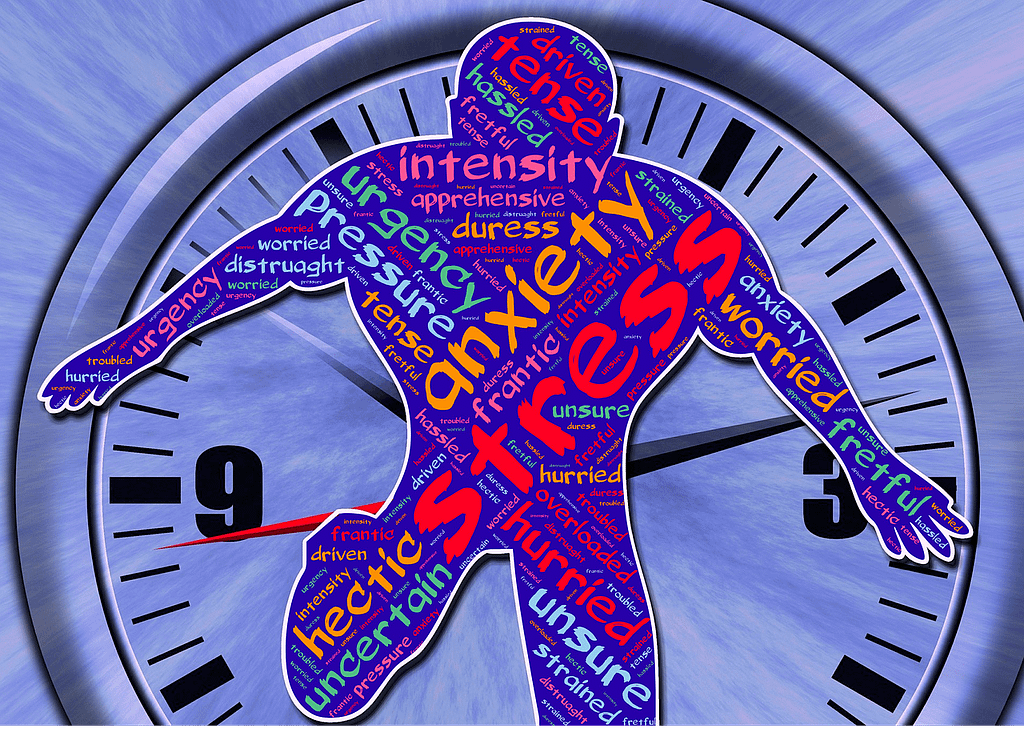INTRODUCTION
How to Reduce Mental Stress and Live a Stress-Free Life
Reducing mental stress and cultivating a stress-free life involves adopting healthy habits that promote emotional balance and resilience. Setting realistic goals, prioritizing self-care activities like exercise or hobbies, practicing mindfulness meditation or relaxation techniques regularly can help alleviate daily stressors.
Establishing boundaries in relationships or work commitments, seeking professional help when needed, maintaining a healthy lifestyle through proper nutrition and adequate sleep are also essential components of living a stress-free life. By incorporating these strategies into your daily routine consistently over time, you will likely start experiencing positive changes in your mental well-being within weeks to months.
Table of Contents
Depression is a common mental health condition characterized by persistent low mood and disturbed sleep. About three quarters of depressed patients have insomnia symptoms, while approximately 40% of young depressed adults and 10% of older patients experience hypersomnia, or excessive sleepiness.
The relationship between hypersomnia and depression is complex, and it’s important to seek help from a healthcare professional for an accurate diagnosis and appropriate treatment plan if you are experiencing symptoms of either condition. Effective management often requires a comprehensive approach to address the impacts on daily functioning and overall well-being

Why Is It Important to Manage Mental Stress?
Managing mental stress is crucial for maintaining optimal mental health and overall well-being. Prolonged exposure to high levels of stress can have detrimental effects on both physical and emotional health, leading to conditions like anxiety disorders, depression, cardiovascular issues, and impaired cognitive function. By actively addressing and managing mental stress through healthy coping mechanisms and self-care practices, you can reduce the risk of developing chronic health conditions, improve your quality of life, enhance resilience in facing life’s challenges, and foster a sense of inner peace.
Are There Natural Ways to Relieve Mental Stress?
Natural ways to relieve mental stress encompass a variety of holistic approaches that focus on promoting relaxation, reducing anxiety, and enhancing overall well-being without relying on medication. Practices like yoga, tai chi, aromatherapy, herbal supplements, or spending time in nature have been shown to have calming effects on the mind and body.
Additionally, incorporating mindfulness meditation, deep breathing exercises, or journaling into your daily routine can help alleviate stress naturally by fostering self-awareness and emotional regulation. Embracing these natural methods can empower you to manage mental stress effectively while nurturing your holistic health

When Is the Best Time to Relieve Mental Stress?
The best time to relieve mental stress is whenever you start feeling overwhelmed, anxious, or emotionally drained. It’s essential to listen to your body and mind’s signals and address stress as soon as it arises rather than letting it escalate. Incorporating regular stress-relief practices into your daily routine can help prevent chronic stress buildup and promote emotional resilience.
Whether it’s taking short breaks throughout the day, practicing mindfulness before bedtime, or engaging in relaxation techniques during stressful moments, finding moments to relieve mental stress proactively can lead to better long-term mental health outcomes.
What Are the Best Ways to Relieve Mental Stress?
Discovering the best ways to relieve mental stress involves exploring a range of strategies that resonate with your individual preferences and needs. Engaging in activities like
.mindfulness meditation
.deep breathing exercises
.physical exercise
or creative outlets can help alleviate stress and promote relaxation.
.Prioritizing self-care practices
.maintaining a healthy lifestyle
.seeking social support
and setting boundaries in your daily routine are also effective ways to manage mental stress.
By experimenting with different techniques and finding what works best for you, you can create a personalized toolkit for relieving mental stress and enhancing your overall well-being.

Who Can Help You Manage Mental Stress?
When it comes to seeking support for managing mental stress, there are various professionals and resources available to assist you on your journey towards better mental well-being.
Psychologists, therapists, counselors
-and psychiatrists are trained to provide therapy and guidance tailored to your specific needs.
Additionally , support ,groups, helplines,
-and online mental health platforms can offer valuable resources and a sense of community for individuals navigating mental stress.
-Seeking help from these professionals and resources can empower you to develop coping strategies,
.gain insights into your stress triggers
.and work towards a healthier mindset
After researching many sources, I found that they all refer to almost the same steps. There is a difference in nomenclature from one source to another, but in general I found that these ten steps are basic and can be relied upon, but a specialist must be sought for the result to be more effective.
Step 1: Understanding Mental Stress
Before diving into strategies for relief, it’s essential to understand what mental stress is and how it impacts your mind and body. Mental stress can manifest in various ways, such as anxiety, irritability, or physical tension. By recognizing the signs of stress, you can take proactive steps to address its root causes and mitigate its effects on your mental health.
Step 2: Practice Deep Breathing Exercises
Deep breathing exercises are a simple yet powerful technique to calm the mind and reduce stress levels. By focusing on slow, deep breaths, you can activate the body’s relaxation response, lower cortisol levels, and promote a sense of tranquility. Incorporating deep breathing into your daily routine can help you manage stress more effectively and enhance your overall well-being.

Step 3: Engage in Physical Activity
Regular physical activity is not only beneficial for your physical health but also plays a significant role in relieving mental stress. Exercise releases endorphins, the body’s natural mood elevators, which can help combat feelings of anxiety and depression. Whether it’s a brisk walk, yoga session, or dance class, finding an activity you enjoy can be a powerful tool in reducing stress levels.
Step 4: Embrace Mindfulness and Meditation
Mindfulness practices and meditation techniques are effective ways to cultivate present-moment awareness and promote mental clarity. By incorporating mindfulness into your daily routine, you can enhance self-awareness, reduce rumination on negative thoughts, and build resilience against stressors. Taking even a few minutes each day to practice mindfulness can have profound effects on your mental well-being.

Step 5: Prioritize Quality Sleep
Quality sleep is essential for mental health and overall well-being. Lack of sleep can exacerbate stress levels and impair cognitive function, making it crucial to prioritize restful sleep each night. Establishing a bedtime routine, creating a comfortable sleep environment, and practicing relaxation techniques before bed can help improve sleep quality and reduce the impact of stress on your mind and body.

Step 6: Maintain a Healthy Diet
Nutrition plays a significant role in mental health, with certain foods having the power to either exacerbate or alleviate stress levels. Consuming a balanced diet rich in fruits, vegetables, whole grains, lean proteins, and healthy fats can provide essential nutrients that support brain function and mood regulation. Avoiding excessive caffeine, sugar, and processed foods can also help stabilize energy levels and promote emotional well-being.

Step 7: Connect with Supportive Relationships
Social connections are vital for mental health and stress management. Cultivating supportive relationships with friends, family members, or community groups can provide emotional support, encouragement, and a sense of belonging during challenging times. Sharing your feelings with trusted individuals and seeking their guidance can help alleviate feelings of isolation and strengthen your resilience against stressors.
Step 8: Practice Relaxation Techniques
Incorporating relaxation techniques into your daily routine can help counteract the effects of stress on both the mind and body. Activities such as progressive muscle relaxation, guided imagery, or aromatherapy can promote relaxation responses in the body, reduce muscle tension, and calm the nervous system. Finding moments throughout the day to engage in these practices can foster a sense of peace and tranquility amidst life’s demands.
Step 9: Manage Time Effectively
Effective time management is key to reducing feelings of overwhelm and stress in daily life. By prioritizing tasks, setting realistic goals, and establishing boundaries around work or personal commitments, you can create a sense of structure and control over your schedule. Utilizing tools like calendars, to-do lists, or time-blocking techniques can help optimize productivity while minimizing stress-inducing procrastination or disorganization.
Step 10: Seek Professional Help if Needed
If you find that despite implementing these strategies you are still struggling with persistent mental stress or anxiety symptoms that interfere with your daily life, it may be beneficial to seek professional help from a mental health provider. Therapists, counselors, or psychiatrists can offer personalized support, therapy techniques, or medication options to address underlying issues contributing to your stress levels effectively.
Conclusion
In conclusion, Chronic stress can have profound impacts on an individual’s physical and psychological well-being. such as high blood pressure, heart disease, obesity, anxiety, and depression. Therefore, managing and reducing stress is crucial for maintaining overall health and preventing the development of these adverse conditions.
managing mental stress is an ongoing journey that requires dedication to self-care practices and prioritizing your mental well-being. By incorporating these ten simple steps into your daily routine – from deep breathing exercises to seeking professional help when needed – you can empower yourself to navigate life’s challenges with resilience and grace while fostering a sense of inner peace and balance.

FAQs
Q1: How long does it take to start seeing results from these strategies?
A: The time required to start experiencing benefits from these strategies varies for each individual based on their unique circumstances; however consistent practice over time typically yields noticeable improvements in mental well-being within weeks to months.
Q2: Are there any specific resources or apps recommended for practicing mindfulness?
A: Yes! Apps like Headspace or Calm offer guided meditation sessions that can be helpful for beginners looking to incorporate mindfulness practices into their daily routine.
Q3: Can dietary changes really impact mental health?
A: Absolutely! Research shows that consuming a balanced diet rich in nutrients like omega-3 fatty acids (found in fish) or magnesium (found in nuts) can positively influence mood regulation and reduce symptoms of anxiety or depression.
Q4: How important is physical activity in managing mental stress?
A: Physical activity plays a crucial role in reducing stress levels by releasing endorphins (feel-good hormones) that boost mood and combat feelings of anxiety or depression; even short bouts of exercise can have immediate benefits for mental well-being. For further information on managing mental stress effectively through holistic approaches like mindfulness practices or dietary changes,








